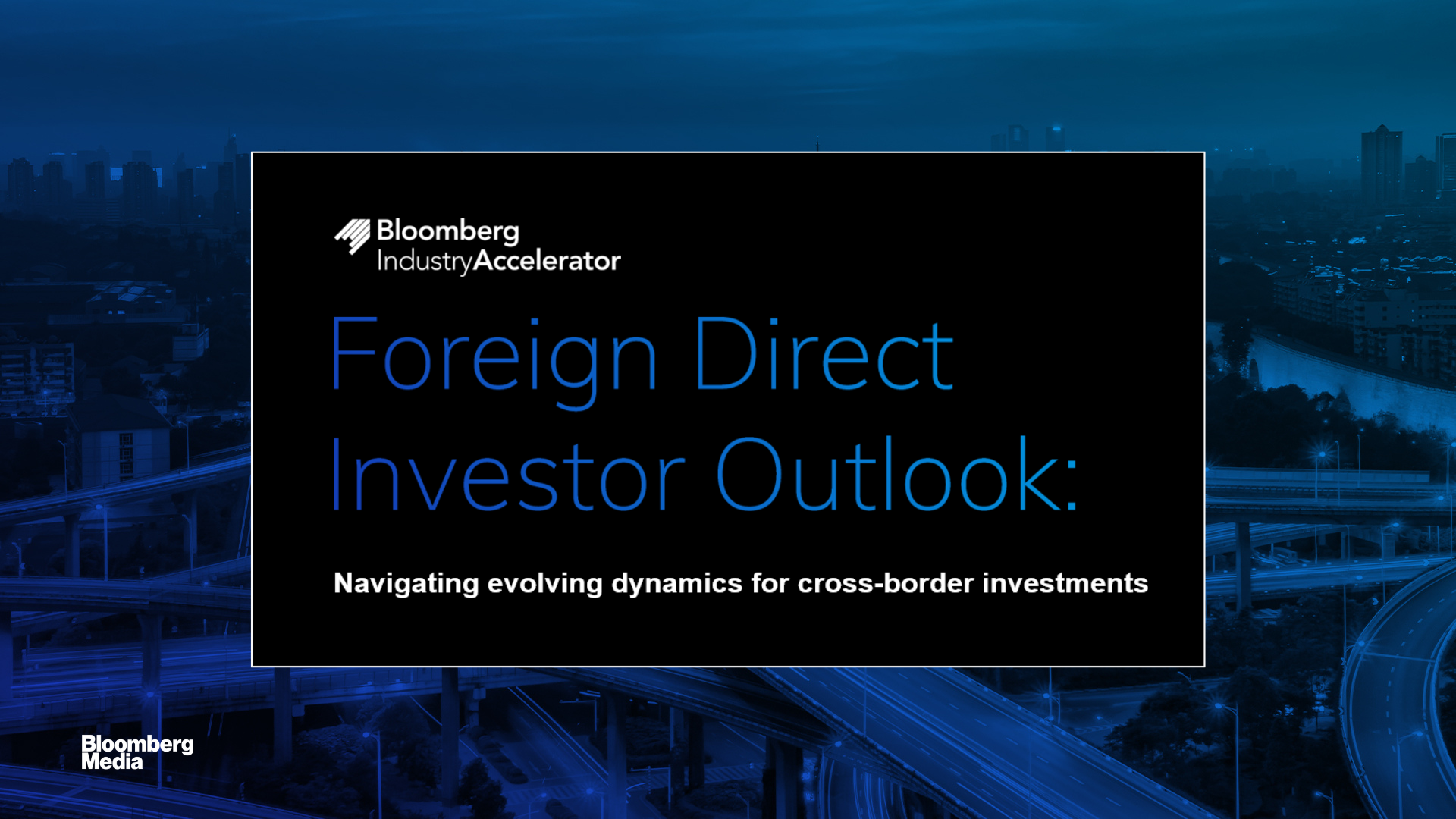September 13, 2023
For leaders seeking to increase revenue for their businesses through international investment, opportunities and challenges have dynamically shifted in recent years. Not only are Foreign Direct Investors (FDIs) still assessing the longstanding impact of the pandemic on foreign supply chains and looming repayment deadlines, but new factors have also arisen—from prolonged inflation, to geopolitical relations, to technological disruptions. While FDIs are seeking to piece together international investment strategies, brands too must evaluate how they can best fit into this equation and drive relevance within the global business landscape.
To better understand the complex nature of international investing today, the Bloomberg Industry Accelerator, Bloomberg Media’s leading system dedicated to developing proprietary sector and audience related analyses and thought leadership, designed the “Foreign Direct Investor Outlook: Navigating evolving dynamics for cross-border investments” study, which unveils findings around the motivations, concerns, and goals of modern FDIs. This report reveals exclusive insights on how international business investors are remaining resilient despite the number of unpredictable factors impacting global expansion plans and the international investment strategies FDIs are betting on for financial growth.
For a preview of our Foreign Direct Investor Outlook findings, check out some of our key insights below. Scroll down to view the complete research summary.
Despite a slight decrease in optimism this year partially attributed to concerns over inflation, FDIs have maintained their positive post-pandemic outlook.
When looking into historical trends from 2019 to today, the latest research indicates a slight dip in optimism levels in 2023 as compared to 2022, where the percentage of FDIs with a positive outlook of the global economy was 56% and 52% respectively. Notably however, today’s optimism levels still remain over 12% higher than pre-pandemic levels. Our recent Global Wealth Blueprint research study echoed this sentiment, indicating increases in positive sentiment surrounding the future of wealth building among high-net-worth retail investors in recent years as well.
While FDI attitudes today indicate positivity, a number of challenges have contributed to the slight decrease in optimism in 2023. More specifically, “prolonged risk of inflation” ranks as the greatest concern for FDIs as 48% view this as a concern for their business in the next 1 to 3 years.
FDIs are seizing new opportunities, especially technological advancements, to overcome modern challenges.
To combat external factors negatively influencing their expansion-related revenue, FDIs are exploring new opportunities. In particular, when asked about areas that present the greatest opportunity for their businesses in the next 1-3 years, accelerated digital transformation (34%), rapid rise of ecommerce (31%) and digital economy agreements (30%) were ranked as three of the top four opportunities.
Bloomberg AiQ, our proprietary AI-driven audience and content platform, further backs the concept of a growing relationship between “foreign direct investment” and “technology innovation.” Data from this platform indicates that between the beginning of 2020 and 2023, global media coverage at the intersection of these two topics has multiplied by at least 7x.
Not only are FDIs viewing technology as a key opportunity, but many see it as a critical component in beating out inflationary pressures and fixing supply chain issues. Over 28% of investors believe that technological and innovation capabilities are the key drivers for their investment projects in the countries they are considering investing in within the next 1-3 years.
Foreign direct investors see ESG as a long-term answer to sustainable development and are incorporating it into their investment plans accordingly.
With ESG remaining a central focus amongst global business leaders, as discussed in last year’s #ChangeTheWorld Report, we also see FDIs considering how to best implement it into their own global business investment strategies. In 2023, 64% of FDIs integrated ESG into their investment strategies, which is a 3% increase from 2022.
Similar to our findings in the Global Wealth Blueprint, today’s FDIs are most interested in E with themes like “Climate Change” and “Environmental Opportunities” garnering the most interest globally. However, regional nuances are apparent when comparing on a market-to-market basis. For example, Latin America prioritizes “Pollution and Waste” whereas North America and Europe remain focused on “Climate Change.”
Read the global research summary for Bloomberg Industry Accelerator’s Foreign Direct Investor Outlook
